When you run a small business, every tool on your desk has to earn its keep. You don’t have time to comb through a tangle of logins, duplicate data, or the back-and-forth of moving between apps.
The smartest teams look for platforms that do double duty – like a two-in-one shampoo and conditioner, but for your workflow.
If you’re already shopping for a CRM, you might as well get one that helps you manage projects, tasks, and delivery.
We’ve reviewed the best CRMs with built-in project management, so you don’t have to combine standalone tools. Here’s how to spot the right fit, and our picks for small business teams in 2025.
Why small businesses are done with switching tabs and tools
Most small teams just want one reliable platform where every client, deal, and project lives. 82% of SMBs want to manage their work from a single system, but more than a third still can’t.
Choosing a CRM with built-in project management is a game-changer:
- You get a complete client picture. All your sales conversations, project notes, and delivery milestones are there when you need them.
- You save real money and time. Tool sprawl hits budgets hard. Most small businesses spend hundreds a month combining the basics – CRM here, project boards there. A typical five-person team spends $150–$300/month running separate tools. It doesn’t have to be this way! Capsule’s all-in-one approach means you pay for one system, not five, and your team spends time on work that matters.
- Teams adopt it because it’s simple. When everything is unified, onboarding is quicker, and day-to-day updates just happen. That means better collaboration and more reliable outcomes.
For small business owners, this is the difference between managing chaos and moving work forward.
The best CRM with project management software for 2025
You can connect your CRM to your project management app and hope the integration holds, or you can choose a CRM with project management built in. With this, your team works from one place – with fewer logins and less busywork.
Today, we’re focusing on the second approach: CRMs that include project management modules out of the box, making it easy for small teams to keep everything – and everyone – on track.
Capsule CRM
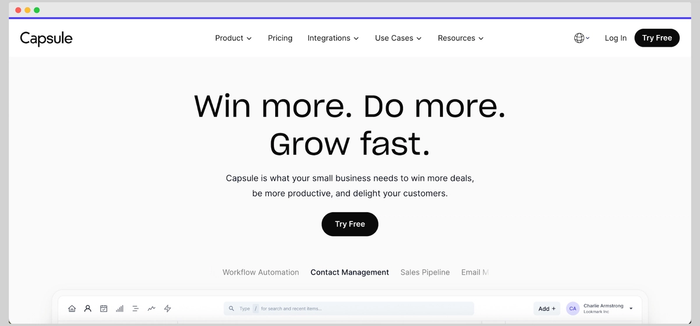
Capsule is designed for small teams who need a CRM that keeps pace, not one that slows them down. Everything, from contacts to sales pipelines to project tasks, sits on a single, tidy dashboard. The Projects feature is built for collaboration, so your team can move work forward without missing details or getting buried in admin. Capsule gives you just enough control to organize your workflow, but stays out of your way so you can get on with your day.
Key features
- Task and project boards: Capsule includes built-in project boards to manage post-sale work, like onboarding or service delivery. You can create reusable project templates and assign tasks to team members.
- Task deadlines and milestones: Keep delivery work on track with due dates, visual progress tracking, and milestone-based task grouping. There is no need for project managers, as everyone can have an overview of individual and team progress.
- Customizable tags and fields: Organize work by priority, client type, or service type using labels and custom fields. Create automated workflows that match how and when you work.
- Linked records: Tie each project to its related contact and sales opportunity for full context. Align team members across departments in real time.
- Integrations with external PM tools: If the built-in features don't meet your needs, Capsule integrates natively with most project management software, such as Asana, Trello, and Monday.com. You can also connect it with other tools through Zapier.
Pricing: starts at $18 per user per month, and a free plan is available.
Considerations
Capsule is intentionally streamlined and doesn’t include features like Gantt charts or workload planning. If you need deep project planning tools, you might want to explore dedicated PM platforms alongside Capsule.

Insightly
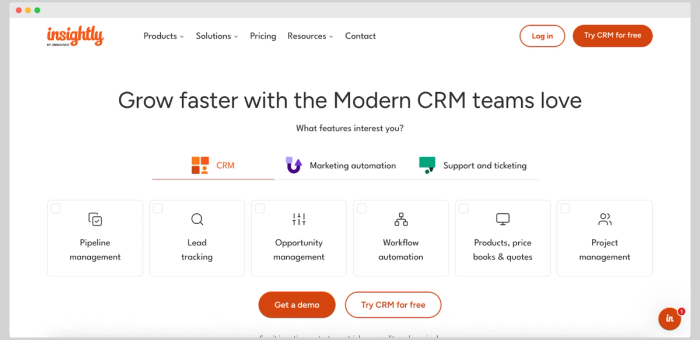
Insightly is packed with project management tools, but doesn’t sacrifice simplicity. When a deal closes, you can turn it into a project. It’s ideal for teams who want their delivery work connected directly to their sales efforts.
Key features
- Project conversion: Turn closed opportunities into projects with a click, keeping all relevant data intact.
- Task dependencies and milestones: Set relationships between tasks, track critical milestones, and monitor timelines.
- Project dashboard: See team activity, task status, and project progress from one overview page.
- Built-in email and contact tracking: All project-related communication is stored alongside tasks and timelines.
Pricing: starts at $29 per user per month, and a free trial is available.
Considerations
Insightly covers the basics for time tracking and resource management, but teams with advanced needs may want to pair it with specialized tools. Its project interface is functional, though it may feel less modern than some standalone apps. Reporting features are strongest on higher-tier plans, so if you’re on a budget, expect simpler reporting.

Bigin by Zoho CRM
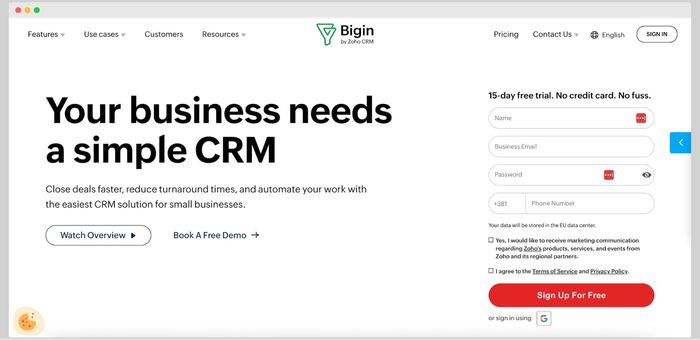
Focused on pipeline visibility and fast setup, Bigin is a lightweight CRM that helps teams track post-sale tasks. While it doesn’t offer full project management, it’s a fit for simple service workflows that don’t require complex features.
Key features
- Team Pipelines: Create pipelines beyond sales, such as onboarding or support, and manage them alongside your deals.
- Activity tracking: Assign follow-up tasks, set reminders, and keep track of all client-facing activities.
- Contact and deal linking: Tasks stay tied to client records and deals for easy reference.
- Integrates with Zoho Projects: For more advanced delivery needs, you can upgrade and connect to Zoho Projects.
Pricing: starts at $7 per user per month.
Considerations
Bigin keeps things simple, but that comes with trade-offs. Without a dedicated project area or visual boards, tasks are all listed together, so it’s easy to lose track of who is doing what and when. The task management is best for single-step activities; businesses with more complex projects or services may soon need a more robust solution.

Bitrix24
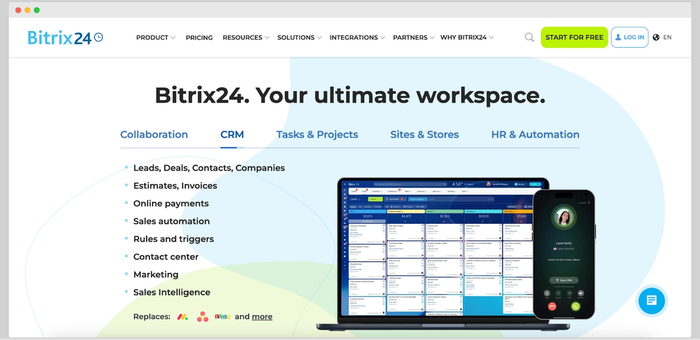
Some small businesses opt for Bitrix24 because of its breadth. Alongside CRM and project management, you get built-in HR tools and a full internal comms suite: handy if you want a single login for your whole operation. Just be prepared for a lot of features: it’s powerful, but it can feel crowded until you make it your own.
Key features
- Built-in task and project management: Create tasks, subtasks, set deadlines, and track progress without needing other tools.
- Gantt charts and workload planning: Visualize timelines and balance assignments across your team.
- Document sharing and chat: Collaborate directly within the platform.
- Time tracking and billing support: Track hours and generate invoices from inside the same workspace.
Pricing: starts at $49/month for five users, and a limited free plan is available.
Considerations
Bitrix24 offers a lot right out of the box, which means the interface can feel crowded, especially for teams new to project management tools. Key features are reserved for higher-tier plans, so costs can rise quickly. And since not every module is easily customizable, some teams may find the platform less intuitive until they’ve tailored it to their needs.

Flowlu
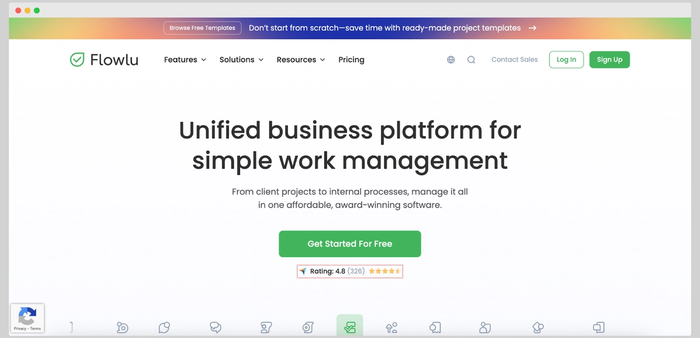
Flowlu brings together various capabilities in a single dashboard. With CRM and project tools working side by side, small teams can keep sales and delivery connected, making it simple to follow through for every client.
Key features
- Project module: Built-in Kanban and Gantt views with task tracking and deadlines.
- Client-to-project handoff: Convert deals into projects while keeping notes, files, and contacts connected.
- Recurring projects: Use templates for repetitive client services.
- Built-in invoicing: Bill directly from the same tool after project completion.
Pricing: starts at $29/month for 2 users, and a free plan is available.
Considerations
Getting Flowlu up and running takes some upfront effort, especially if you plan to use several modules. The mobile app is still catching up to the browser version, which could slow down field teams. Also worth noting: support is responsive on premium plans, but expect longer wait times if you’re on the entry tier.

Apptivo
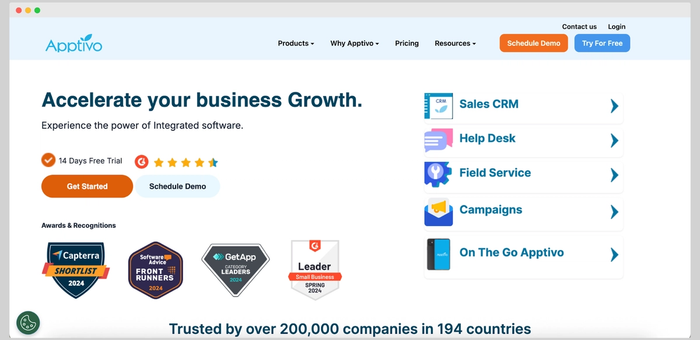
Apptivo lets you build your own workspace by adding just the apps your team needs – whether that’s CRM, project management, or something else. This modular approach gives small businesses room to grow and customise, with features that support every stage of client work.
Key features:
- Integrated project app: Create projects from opportunities or tasks, and manage timelines in the same system.
- Custom task views: Use Gantt, list, or Kanban formats to match your working style.
- Time tracking and expenses: Built-in features for teams billing clients for service hours.
- Project templates: Save time with reusable formats for similar engagements.
Pricing: starts at $12/user/month, and a free trial is available.
Considerations:
Apptivo gets the job done, but the look and feel is a bit old school compared to some newer tools. Getting set up takes some tinkering, especially if you want to unlock extra features. And if you need help, you’ll mostly be reaching out to Apptivo directly – there isn’t much in the way of community tips or tutorials.

Scoro
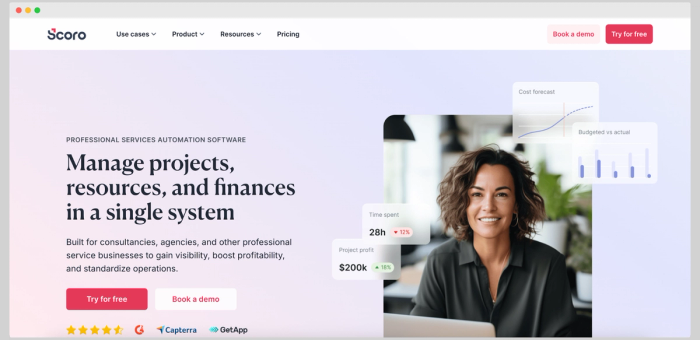
If your business depends on multi-step projects, Scoro covers it all. It’s a great fit for service teams that need CRM, quoting, and financial tools working together, especially if you bill by the hour or handle complex client work.
Key features
- Task and project tracking: Built-in tools for assigning tasks, setting milestones, and visualizing timelines.
- Quote-to-project conversion: Turn quotes into projects with assigned budgets and work segments.
- Time billing and profitability tracking: Measure actual vs. planned time and track margins.
- Team workload view: See who’s busy and what’s falling behind.
Pricing: starts at $19.9/user/month, and a free trial is available.
Considerations
Scoro comes with a deep feature set, which might be more than some teams require, especially for straightforward projects. It takes some time to get fully up to speed, so plan for a bit of training. For example, financial tools are included, but you’ll need a higher-tier plan to unlock the full set.

Pipedrive (with Projects)
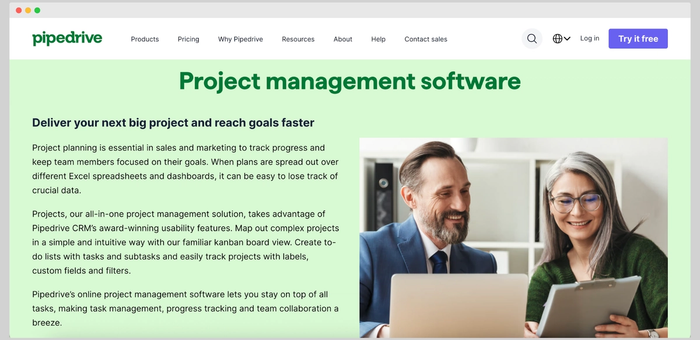
When you need to manage client projects right after closing a deal, Pipedrive’s Projects add-on keeps everything connected. You can handle post-sale tasks alongside your pipeline, so there’s no need to switch between separate apps.
Key features:
- Projects add-on: Organize tasks and notes in project boards tied to won deals.
- Task lists and reminders: Set deadlines and track work needed after a deal closes.
- Custom pipelines: Build delivery workflows that match your professional services.
- Activity history: All project actions are logged in the same timeline as CRM records.
Pricing: CRM pricing at $14.90/user/month, Projects add-on is $8/user/month (total $22.90/user/month).
Considerations:
Projects is a simple add-on—handy for tracking basic tasks, but lighter on features than most standalone project tools. There’s no support for Gantt charts or complex project flows, so it’s best for straightforward jobs. Since Projects is a paid extra on top of Pipedrive’s core CRM, you may find better value pairing Pipedrive with a dedicated project management app if your needs are more advanced.

Conclusion
The best CRM with project management is the one that fits your team’s pace, keeping sales, projects, and client work clear and connected. If you value a setup that’s easy to run with, Capsule is designed for small businesses that want structure and hate clutter.
Try it out for yourself and see if it brings the clarity and focus your team needs.
Frequently Asked Questions
You keep your work and client info in one place, so it’s easier for everyone to stay in the loop. And because you’re not paying for extra software, it’s kinder on your budget, too.
It depends on what you need. For most small businesses, having one place to manage clients and projects is quicker and easier. But if your projects are especially complex, a dedicated PM app could still be useful.
Not really. Most CRMs with project features are built to adapt as your business changes, so you can shape your workflows and task lists however you like.
Businesses that deliver services and need to keep client work and sales moving side by side get the most value – think agencies, consultancies, or any team where delivery and sales are closely linked.




